11 books about Deindustrialization
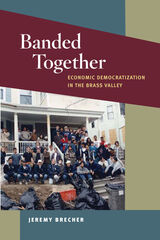
Banded Together
Economic Democratization in the Brass Valley
Jeremy Brecher
University of Illinois Press, 2011
Providing incisive commentary on the historical and contemporary American working class experience, Banded Together: Economic Democratization in the Brass Valley documents a community's efforts to rebuild and revitalize itself in the aftermath of deindustrialization. Through powerful oral histories and other primary sources, Jeremy Brecher tells the story of a group of average Americans--factory workers, housewives, parishioners, and organizers--who tried to create a democratic alternative to the economic powerlessness caused by the closing of factories in the Connecticut Naugatuck Valley region during the 1970s and 1980s. This volume focuses on grassroots organization, democratically controlled enterprises, and supportive public policies, providing examples from the Naugatuck Valley Project community-alliance that remain relevant to the economic problems of today and tomorrow. Drawing on more than a hundred interviews with Project leaders, staff, and other knowledgeable members of the local community, Brecher illustrates how the Naugatuck Valley Project served as a vehicle for community members to establish greater control over their economic lives.
[more]
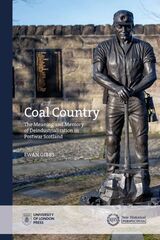
Coal Country
The Meaning and Memory of Deindustrialization in Postwar Scotland
Ewan Gibbs
University of London Press, 2022
The flooding and subsequent closure of Scotland’s last deep coal mine in 2002 was a milestone event in the nation’s deindustrialization. Villages and towns across the densely populated Central Belt of Scotland owe their existence to coal mining’s expansion during the nineteenth century and its maturation in the twentieth. Colliery closures and job losses were not just experienced in economic terms: they also had profound social, cultural, and political implications. Coal Country documents this process of deindustrialization and its effects, drawing on archival records from the UK government, the nationalized coal industry, trade unions, and transcripts from an extensive oral history project. Deindustrialization, we learn, progressed slowly but powerfully across the second half of the twentieth century. Coal Country explains the deep roots of economic changes and their political reverberations, which continue to be felt to this day.
[more]
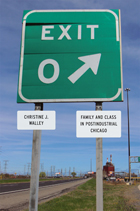
Exit Zero
Family and Class in Postindustrial Chicago
Christine J. Walley
University of Chicago Press, 2012
Winner of CLR James Book Prize from the Working Class Studies Association and 2nd Place for the Victor Turner Prize in Ethnographic Writing.
In 1980, Christine J. Walley’s world was turned upside down when the steel mill in Southeast Chicago where her father worked abruptly closed. In the ensuing years, ninety thousand other area residents would also lose their jobs in the mills—just one example of the vast scale of deindustrialization occurring across the United States. The disruption of this event propelled Walley into a career as a cultural anthropologist, and now, in Exit Zero, she brings her anthropological perspective home, examining the fate of her family and that of blue-collar America at large.
In 1980, Christine J. Walley’s world was turned upside down when the steel mill in Southeast Chicago where her father worked abruptly closed. In the ensuing years, ninety thousand other area residents would also lose their jobs in the mills—just one example of the vast scale of deindustrialization occurring across the United States. The disruption of this event propelled Walley into a career as a cultural anthropologist, and now, in Exit Zero, she brings her anthropological perspective home, examining the fate of her family and that of blue-collar America at large.
Interweaving personal narratives and family photos with a nuanced assessment of the social impacts of deindustrialization, Exit Zero is one part memoir and one part ethnography— providing a much-needed female and familial perspective on cultures of labor and their decline. Through vivid accounts of her family’s struggles and her own upward mobility, Walley reveals the social landscapes of America’s industrial fallout, navigating complex tensions among class, labor, economy, and environment. Unsatisfied with the notion that her family’s turmoil was inevitable in the ever-forward progress of the United States, she provides a fresh and important counternarrative that gives a new voice to the many Americans whose distress resulting from deindustrialization has too often been ignored.
This book is part of a project that also includes a documentary film.
This book is part of a project that also includes a documentary film.
[more]
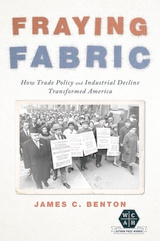
Fraying Fabric
How Trade Policy and Industrial Decline Transformed America
James C. Benton
University of Illinois Press, 2022
The decline of the U.S. textile and apparel industries between the 1940s and 1970s helped lay the groundwork for the twenty-first century's potent economic populism in America. James C. Benton looks at how shortsighted trade and economic policy by labor, business, and government undermined an employment sector that once employed millions and supported countless communities. Starting in the 1930s, Benton examines how the New Deal combined promoting trade with weakening worker rights. He then moves to the ineffective attempts to aid textile and apparel workers even as imports surged, the 1974 pivot by policymakers and big business to institute lowered trade barriers, and the deindustrialization and economic devastation that followed. Throughout, Benton provides the often-overlooked views of workers, executives, and federal officials who instituted the United States’ policy framework in the 1930s and guided it through the ensuing decades. Compelling and comprehensive, Fraying Fabric explains what happened to textile and apparel manufacturing and how it played a role in today's politics of anger.
[more]
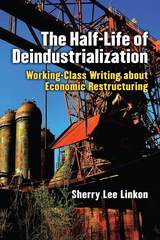
The Half-Life of Deindustrialization
Working-Class Writing about Economic Restructuring
Sherry Lee Linkon
University of Michigan Press, 2018
Starting in the late 1970s, tens of thousands of American industrial workers lost jobs in factories and mines. Deindustrialization had dramatic effects on those workers and their communities, but its longterm effects continue to ripple through working-class culture. Economic restructuring changed the experience of work, disrupted people’s sense of self, reshaped local landscapes, and redefined community identities and expectations. Through it all, working-class writers have told stories that reflect the importance of memory and the struggle to imagine a different future. These stories make clear that the social costs of deindustrialization affect not only those who lost their jobs but also their children, their communities, and American culture.
Through analysis of poetry, fiction, creative nonfiction, film, and drama, The Half-Life of Deindustrialization shows why people and communities cannot simply “get over” the losses of economic restructuring. The past provides inspiration and strength for working-class people, even as the contrast between past and present highlights what has been lost in the service economy. The memory of productive labor and stable, proud working-class communities shapes how people respond to contemporary economic, social, and political issues. These stories can help us understand the resentment, frustration, pride, and persistence of the American working class.
Through analysis of poetry, fiction, creative nonfiction, film, and drama, The Half-Life of Deindustrialization shows why people and communities cannot simply “get over” the losses of economic restructuring. The past provides inspiration and strength for working-class people, even as the contrast between past and present highlights what has been lost in the service economy. The memory of productive labor and stable, proud working-class communities shapes how people respond to contemporary economic, social, and political issues. These stories can help us understand the resentment, frustration, pride, and persistence of the American working class.
[more]

The Lowell Experiment
Public History in a Postindustrial City
Cathy Stanton
University of Massachusetts Press, 2006
In the early nineteenth century, Lowell, Massachusetts, was widely studied and emulated as a model for capitalist industrial development. One of the first cities in the United States to experience the ravages of deindustrialization, it was also among the first places in the world to turn to its own industrial and ethnic history as a tool for reinventing itself in the emerging postindustrial economy. The Lowell Experiment explores how history and culture have been used to remake Lowell and how historians have played a crucial yet ambiguous role in that process.
The book focuses on Lowell National Historical Park, the flagship project of Lowell's new cultural economy. When it was created in 1978, the park broke new ground with its sweeping reinterpretations of labor, immigrant, and women's history. It served as a test site for the ideas of practitioners in the new field of public history—a field that links the work of professionally trained historians with many different kinds of projects in the public realm.
The Lowell Experiment takes an anthropological approach to public history in Lowell, showing it as a complex cultural performance shaped by local memory, the imperatives of economic redevelopment, and tourist rituals—all serving to locate the park's audiences and workers more securely within a changing and uncertain new economy characterized by growing inequalities and new exclusions.
The paradoxical dual role of Lowell's public historians as both interpreters of and contributors to that new economy raises important questions about the challenges and limitations facing academically trained scholars in contemporary American culture. As a long-standing and well-known example of "culture-led re-development," Lowell offers an outstanding site for exploring questions of concern to those in the fields of public and urban history, urban planning, and tourism studies.
The book focuses on Lowell National Historical Park, the flagship project of Lowell's new cultural economy. When it was created in 1978, the park broke new ground with its sweeping reinterpretations of labor, immigrant, and women's history. It served as a test site for the ideas of practitioners in the new field of public history—a field that links the work of professionally trained historians with many different kinds of projects in the public realm.
The Lowell Experiment takes an anthropological approach to public history in Lowell, showing it as a complex cultural performance shaped by local memory, the imperatives of economic redevelopment, and tourist rituals—all serving to locate the park's audiences and workers more securely within a changing and uncertain new economy characterized by growing inequalities and new exclusions.
The paradoxical dual role of Lowell's public historians as both interpreters of and contributors to that new economy raises important questions about the challenges and limitations facing academically trained scholars in contemporary American culture. As a long-standing and well-known example of "culture-led re-development," Lowell offers an outstanding site for exploring questions of concern to those in the fields of public and urban history, urban planning, and tourism studies.
[more]

The Miners of Decazeville
A Genealogy of Deindustrialization
Donald Reid
Harvard University Press, 1985
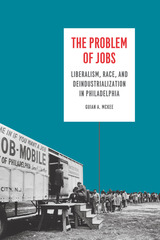
The Problem of Jobs
Liberalism, Race, and Deindustrialization in Philadelphia
Guian A. McKee
University of Chicago Press, 2008
Contesting claims that postwar American liberalism retreated from fights against unemployment and economic inequality, The Problem of Jobs reveals that such efforts did not collapse after the New Deal but instead began to flourish at the local, rather than the national, level.
With a focus on Philadelphia, this volume illuminates the central role of these local political and policy struggles in shaping the fortunes of city and citizen alike. In the process, it tells the remarkable story of how Philadelphia’s policymakers and community activists energetically worked to challenge deindustrialization through an innovative series of job retention initiatives, training programs, inner-city business development projects, and early affirmative action programs. Without ignoring the failure of Philadelphians to combat institutionalized racism, Guian McKee's account of their surprising success draws a portrait of American liberalism that evinces a potency not usually associated with the postwar era. Ultimately interpreting economic decline as an arena for intervention rather than a historical inevitability, The Problem of Jobs serves as a timely reminder of policy’s potential to combat injustice.
With a focus on Philadelphia, this volume illuminates the central role of these local political and policy struggles in shaping the fortunes of city and citizen alike. In the process, it tells the remarkable story of how Philadelphia’s policymakers and community activists energetically worked to challenge deindustrialization through an innovative series of job retention initiatives, training programs, inner-city business development projects, and early affirmative action programs. Without ignoring the failure of Philadelphians to combat institutionalized racism, Guian McKee's account of their surprising success draws a portrait of American liberalism that evinces a potency not usually associated with the postwar era. Ultimately interpreting economic decline as an arena for intervention rather than a historical inevitability, The Problem of Jobs serves as a timely reminder of policy’s potential to combat injustice.
[more]
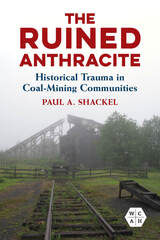
The Ruined Anthracite
Historical Trauma in Coal-Mining Communities
Paul A. Shackel
University of Illinois Press, 2023
Once a busy if impoverished center for the anthracite coal industry, northeastern Pennsylvania exists today as a region suffering inexorable decline--racked by economic hardship and rampant opioid abuse, abandoned by young people, and steeped in xenophobic fear. Paul A. Shackel merges analysis with oral history to document the devastating effects of a lifetime of structural violence on the people who have stayed behind. Heroic stories of workers facing the dangers of underground mining stand beside accounts of people living their lives in a toxic environment and battling deprivation and starvation by foraging, bartering, and relying on the good will of neighbors. As Shackel reveals the effects of these long-term traumas, he sheds light on people’s poor health and lack of well-being. The result is a valuable on-the-ground perspective that expands our understanding of the social fracturing, economic decay, and anger afflicting many communities across the United States.
Insightful and dramatic, The Ruined Anthracite combines archaeology, documentary research, and oral history to render the ongoing human cost of environmental devastation and unchecked capitalism.
[more]
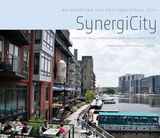
SynergiCity
Reinventing the Postindustrial City
Edited by Paul Hardin Kapp and Paul J. Armstrong
University of Illinois Press, 2012
SynergiCity: Reinventing the Postindustrial City proposes a new and invigorating vision of urbanism, architectural design, and urban revitalization in twenty-first-century America. Culling transformative ideas from the realms of historic preservation, sustainability, ecological urbanism, and the innovation economy, Paul Hardin Kapp and Paul J. Armstrong present a holistic vision for restoring industrial cities suffering from population decline back into stimulating and productive places to live and work.
With a particular emphasis on the Rust Belt of the American Midwest, SynergiCity argues that cities such as Detroit, St. Louis, and Peoria must redefine themselves to be globally competitive. This revitalization is possible through environmentally and economically sustainable restoration of industrial areas and warehouse districts for commercial, research, light industrial, and residential uses. The volume's expert researchers, urban planners, and architects draw on the redevelopment successes of other major cities--such as the American Tobacco District in Durham, North Carolina, and the Milwaukee River Greenway--to set guidelines and goals for reinventing and revitalizing the postindustrial landscape.
Contributors are Paul J. Armstrong, Donald K. Carter, Lynne M. Dearborn, Norman W. Garrick, Mark Gillem, Robert Greenstreet, Craig Harlan Hullinger, Paul Hardin Kapp, Ray Lees, Emil Malizia, John O. Norquist, Christine Scott Thomson, and James Wasley.
[more]
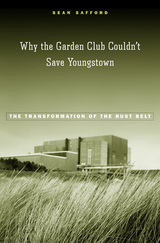
Why the Garden Club Couldn't Save Youngstown
The Transformation of the Rust Belt
Sean Safford
Harvard University Press, 2009
In this book, Sean Safford compares the recent history of Allentown, Pennsylvania, with that of Youngstown, Ohio. Allentown has seen a noticeable rebound over the course of the past twenty years. Facing a collapse of its steel-making firms, its economy has reinvented itself by transforming existing companies, building an entrepreneurial sector, and attracting inward investment. Youngstown was similar to Allentown in its industrial history, the composition of its labor force, and other important variables, and yet instead of adapting in the face of acute economic crisis, it fell into a mean race to the bottom.Challenging various theoretical perspectives on regional socioeconomic change, Why the Garden Club Couldn’t Save Youngstown argues that the structure of social networks among the cities’ economic, political, and civic leaders account for the divergent trajectories of post-industrial regions. It offers a probing historical explanation for the decline, fall, and unlikely rejuvenation of the Rust Belt. Emphasizing the power of social networks to shape action, determine access to and control over information and resources, define the contexts in which problems are viewed, and enable collective action in the face of externally generated crises, this book points toward present-day policy prescriptions for the ongoing plight of mature industrial regions in the U.S. and abroad.
[more]
READERS
Browse our collection.
PUBLISHERS
See BiblioVault's publisher services.
STUDENT SERVICES
Files for college accessibility offices.
UChicago Accessibility Resources
home | accessibility | search | about | contact us
BiblioVault ® 2001 - 2024
The University of Chicago Press









